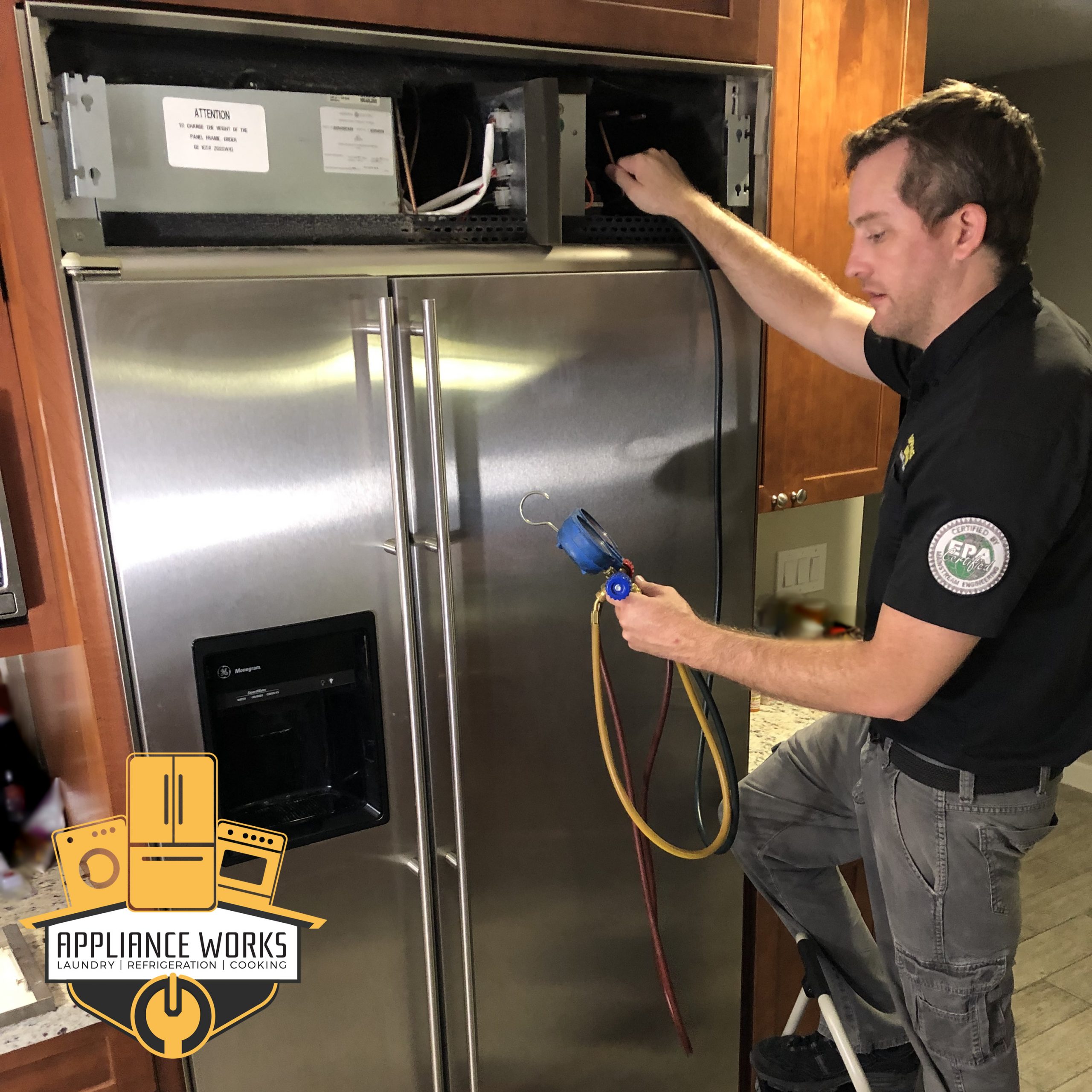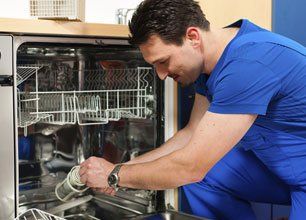Necessary Tips for Effective Ref Repair Service to Extend Device Life Expectancy
When it involves your refrigerator, correct repair service and maintenance are crucial for longevity. You may not realize how tiny concerns can rise if they're left unaddressed. Normal examinations and basic repairs can save you from pricey substitutes down the line. Recognizing usual problems and understanding when to act can make all the difference. Let's check out some necessary pointers that will certainly aid you keep your fridge running efficiently for many years to come.
Recognizing Typical Fridge Problems
Refrigerators are essential in keeping your food fresh, but they can come across a range of usual problems that interrupt their performance. One regular issue is poor cooling. If you see food ruining quicker than common, examine the thermostat settings or think about if the door seals are harmed. An additional usual trouble is too much noise, which might suggest a malfunctioning compressor or a failing follower. You could also experience water merging inside or beneath the fridge; this typically results from a stopped up defrost drain or a faulty water line. Additionally, if your refrigerator's light isn't functioning, it can be a simple bulb concern or a problem with the door button. Finally, ice buildup in the fridge freezer can hinder air movement and cooling down efficiency. Identifying these problems early can save you money and time out of commission, guaranteeing your fridge runs efficiently and effectively.
Regular Upkeep Practices
To keep your home appliances running efficiently, you need to remain on top of routine upkeep practices. Tidy the condenser coils, inspect the door seals, and keep track of the temperature level settings to assure peak efficiency. These straightforward tasks can conserve you money and time on repair work down the line.
Clean Condenser Coils On A Regular Basis
Cleaning your condenser coils on a regular basis can greatly boost your device's performance. Dust and dust accumulate on these coils with time, causing your appliance to function more difficult and take in more energy. To keep them clean, disconnect your device and meticulously get rid of any type of safety covers. Use a vacuum cleaner with a brush accessory or a soft brush to delicately remove debris. If needed, a combination of cozy water and moderate detergent can aid eliminate persistent crud. See to it to allow every little thing dry totally prior to reassembling and plugging the appliance back in. Goal to cleanse your coils at the very least two times a year, or more frequently if you have family pets or live in a dirty setting. This simple job can expand the lifespan of your device substantially.
Inspect Door Seals
3 easy actions can help you ensure your home appliance's door seals remain in good condition. Evaluate the seals on a regular basis for any kind of fractures, rips, or signs of wear. These damages can bring about air leaks, influencing efficiency. 2nd, clean the seals making use of warm, soapy water to get rid of any type of particles or grime. A tidy seal guarantees a tight fit and far better efficiency. Do a simple examination by closing the door on an item of paper. If you can easily pull it out without resistance, the seal may require replacing. By complying with these actions, you'll keep your appliance's performance and durability, conserving you cash on power costs and repair services in the long run.
Display Temperature Setups
Frequently monitoring your device's temperature level settings is essential for ideal efficiency and efficiency. Whether you're handling a refrigerator, freezer, or stove, maintaining an eye on these setups can stop lots of problems. For fridges, objective for temperatures in between 35 ° F and 38 ° F; for freezers, remain 0 ° F. If the temperatures are as well high or reduced, your device might function harder, losing power and reducing its life expectancy. Make use of a thermostat to check these setups consistently, specifically after major adjustments, like relocating your device or readjusting the thermostat. If you see fluctuations, change the setups appropriately and seek advice from the individual guidebook for assistance. By staying positive about temperature monitoring, you'll assure your devices run efficiently and last much longer.
Fixing Cooling Issues
When your fridge isn't cooling down appropriately, it can cause spoiled food and squandered cash, so addressing the concern quickly is crucial. Start by inspecting the temperature setups to validate they go to the advised degrees, normally around 37 ° F for the fridge and 0 ° F for the freezer. If the setups are correct, inspect the door seals for any spaces or damage; a defective seal can allow warm air to get in.
Next, check out the vents inside the refrigerator and freezer. Validate they're not blocked by washing machine repair home service near me food things, as this can interrupt airflow. Pay attention for the compressor; if it's not running or making uncommon noises, it might require attention. Examine the condenser coils, generally located at the back or bottom of the unit. Dust and debris can build up, creating cooling problems. Clean them with a vacuum cleaner or brush to optimize efficiency. If issues continue, it could be time to call a specialist.
Repairing Water Leakage and Ice Build-Up
If you're managing water leak or ice build-up in your home appliance, it's important to determine the resource of the issue. By determining where the water is coming from, you can avoid additional concerns and prevent costly repair work. Let's check out some effective strategies to tackle these common troubles.
Determine Leakage Sources
Just how can you effectively identify the resources of water leak and ice build-up in your devices? Beginning by checking the seals and gaskets on your fridge and freezer doors. A used or broken seal can allow warm air to go into, causing condensation and ice. Next, check the drainpipe frying pan and water drainage system for obstructions or blockages; a backed-up drain can result in water pooling. Search for any type of loose links in the water supply line, which can produce leaks. Also, check out the defrost drainpipe for ice buildup, which could interfere with correct drainage. By methodically examining these locations, you'll pinpoint the resource of the problem, permitting you to take the required actions to repair it and extend your home appliance's life expectancy.
Stop Ice Development
To avoid ice development in your appliances, begin by confirming the temperature setups are proper. If your refrigerator or freezer is as well cold, it can cause excessive ice build-up. Check the door seals regularly; damaged seals can let warm air in, causing condensation and ice development.
Maintain the appliance well-ventilated and prevent overcrowding, as this can block air flow - Dependable Refrigeration & Appliance Repair Refrigerator repair specialist of Oro Valley. Also, regularly defrost your fridge freezer if it doesn't have an automated defrost function.
If you notice water leakage, identify and fix any obstructed drainage holes, as they can add to ice build-up. Ultimately, tidy the coils and validate they're operating properly to preserve peak performance. Taking these actions will certainly aid extend your device's life expectancy and performance.
Resolving Noisy Refrigerator Appears
While it might seem worrying, a loud refrigerator typically indicates small issues instead of major breakdowns. Initially, identify the source of the noise. Common perpetrators include the compressor, fans, and water lines. If you hear a buzzing sound, it may be the compressor striving; this might simply be a regular procedure audio.
Following, look for loosened things inside. Often, containers or shelves can rattle, developing unwanted sound. Tighten or reorganize them to eliminate the sounds.
If you notice a clicking sound, it could be the defrost timer. This is generally harmless but can suggest it needs evaluation.
Finally, validate your refrigerator is degree. An out of balance device can pop over to these guys generate vibrations and sound. Use a degree to inspect, and adjust the feet if needed. Attending to these concerns immediately can assist keep your refrigerator's efficiency and prolong its life expectancy.
When to Replace Components vs. Full Substitute

Nevertheless, if your device is older and experiencing numerous problems, a complete replacement can be much more cost-effective. Take into consideration the price of repairs versus the home appliance's value. If repairs surpass 50% of a brand-new system's rate, it's typically better to buy a substitute. Furthermore, if you observe ongoing issues that keep repeating, it's a sign that your device has gotten to completion of its life. Consider these aspects very carefully to make Recommended Site the ideal decision for your demands and budget plan.
Knowing When to Call an Expert
Just how can you tell when it's time to call in an expert for appliance repair service? If your device quits working completely or often trips circuit breakers, it's one more red flag.
You need to also consider your very own comfort degree with repairs. If you're unsure concerning detecting the issue or do not have the right tools, it's ideal to reach out for aid. Keep in mind, trying challenging repairs can bring about more damages or also safety threats.

Frequently Asked Concerns
How Commonly Should I Tidy the Fridge Coils?
You must clean your refrigerator coils every 6 months. This assists keep performance and protects against getting too hot. If you notice extreme dust or family pet hair, clean them extra frequently to guarantee your refrigerator runs efficiently.

Can I Make Use Of Vinegar for Cleaning My Fridge?
Yes, you can utilize vinegar to clean your fridge! It's an excellent natural cleaner that eliminates smells and stains. Washing Machine Repair Dependable Refrigeration & Appliance Repair Service. Simply blend it with water, use it to surfaces, and clean down for a fresh, tidy refrigerator
What Temperature Should My Refrigerator Be Set To?
You need to establish your refrigerator to 37 ° F(3 ° C) for ideal food conservation. This temperature level maintains your food fresh while avoiding wasting, guaranteeing your grocery stores last longer and decreasing waste. It's a simple modification you can make!
Does a Fridge Need to Be Leveled?
Yes, your fridge requires to be leveled. If it's uneven, it can affect cooling down effectiveness and trigger excess sound. Check the leveling legs and adjust them to ensure appropriate equilibrium for suitable efficiency.
How Can I Decrease Refrigerator Energy Consumption?
To decrease your refrigerator's energy consumption, maintain it tidy and well-ventilated, examine door seals for leaks, established the temperature between 35-38 ° F, and avoid straining it. These actions can substantially reduce your energy bills.